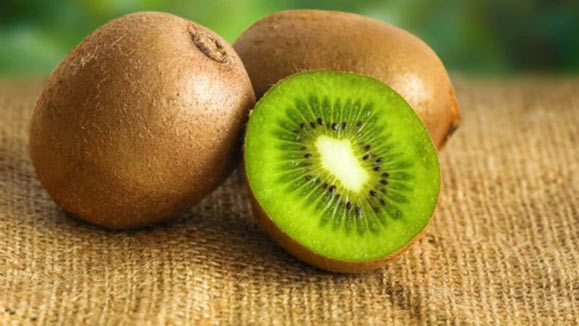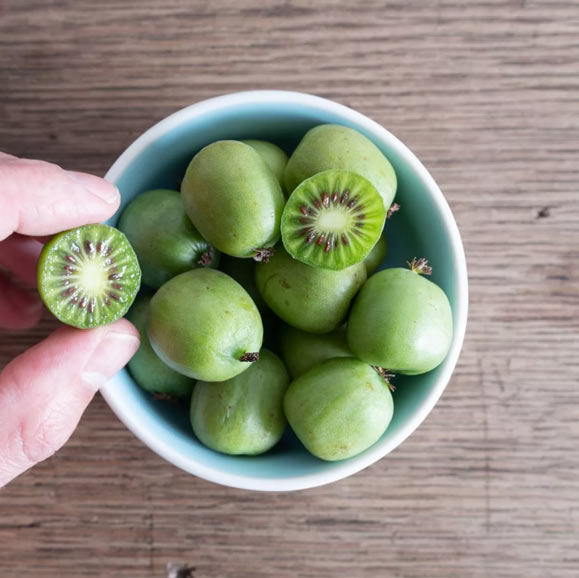The Power-Packed Kiwi: Unveiling its Nutritional Profile
Dec 15, 2023 By Madison Evans
At first glance, the modest green kiwi may seem unlikely to be a nutritional powerhouse. However, its unassuming exterior hides a trove of vitamins, minerals, antioxidants, and fibers unmatched by most other fruits.

Often overlooked in favor of trendier “superfoods,” the kiwi offers health benefits that rival those of far more hyped produce. By adding just a couple of these fuzzy, brown-speckled fruits to your daily diet, you can be well on your way to better health.
Nutrition Facts - Low in Calories, High in Nutrients
Kiwis are low in calories, with only 55 calories per 100g. Yet, they manage to pack high amounts of vitamin C, vitamin K, vitamin E, folate, and potassium.
They also contain a decent array of minerals like copper, magnesium, and phosphorus. Plus, they are rich in antioxidants and deliver a hearty dose of fiber.
Vitamin C Powerhouse
Ounce for ounce, kiwis contain even more vitamin C than oranges. One large kiwi meets your daily vitamin C needs, providing 139% of your recommended daily intake.
This vital nutrient boosts immunity by stimulating white blood cell production. As an antioxidant, it guards your cells from harm caused by free radicals.
High Fiber Content Keeps You Regular
Kiwis are one of the most fiber-rich fruits around. A 100g serving provides around 13% of your daily fiber needs.
By sweeping waste through your digestive tract, this indigestible plant material helps to avoid constipation and encourage regular bowel movements. Additionally, kiwi fiber may reduce cholesterol and regulate blood sugar surges.
Kiwi Health Benefits

Kiwi Nutrients Protect Your Cells
The nutrients in kiwis offer antioxidant effects that prevent oxidative damage to your cells. Vitamins C and E team up with carotenoid antioxidants like lutein and zeaxanthin to neutralize harmful free radicals.
Kiwis even contain various trace phytochemicals with antioxidant capacities, including flavonoids like quercetin, gallic acid, catechins, and epicatechins.
Kiwi Nutrition Benefits Your Heart
The fiber, vitamin C, potassium, and antioxidant compounds in kiwis deliver cardiovascular perks as well. Vitamin C and antioxidants protect against LDL cholesterol oxidation, while potassium relaxes blood vessel walls.
Together, these effects may lower high blood pressure, discourage blood clots, and preserve heart health. The fiber in kiwis can also keep cholesterol levels in check.
Kiwi Nutrition for Improved Immunity
Kiwis don’t call it quits after fortifying your cardiovascular system. They also dial up your immune defenses.
That hefty dose of vitamin C stimulates white blood cell activity for heightened immunity. It also enables the absorption of iron, a mineral vital to immune cell function.
Plus, the carotenoids and antioxidants in kiwis combat inflammation, preserving immune responsiveness. This makes kiwis a smart fruit choice during cold and flu season.
Kiwi Nutrition Benefits Digestion
The fiber content of kiwis confers digestive benefits as well. Soluble fiber forms a gel-like matrix that slows digestion, controlling blood sugar spikes. Insoluble fiber whisks waste through your intestines, easing constipation.
These effects combine to promote digestive regularity and healthy gut bacteria. The nutrients in kiwis may also reduce colon cancer risk by binding carcinogens and limiting inflammation.
Kiwi Nutrition and Blood Clotting
Clots form when certain blood cells clump together, blocking proper blood flow. Vitamin C and polyphenols in kiwis inhibit platelet aggregation, discouraging blood clots. Potassium also relaxes blood vessels, optimizing blood flow.
Together, these effects preserve cardiovascular function and may lower stroke risk. Those prone to clotting disorders can benefit from adding kiwis to their diet.
Kiwi Fruit Calorie Content
One large kiwi (around 70g) provides:
- Calories: 42
- Carbohydrates: 11g
- Fiber: 2g
- Sugar: 6g
Kiwis offer the nutritional benefits of fruit with a low calorie and sugar impact. This makes them ideal for weight loss and blood sugar control diets.
Top 7 Kiwi Health Benefits
To summarize, here are seven science-backed ways kiwis benefit your health:
- Boost immunity with ample vitamin C
- Lower blood pressure due to high potassium
- Control blood sugar and weight via fiber
- Protect cells from oxidative damage through antioxidants
- Preserve heart health with potassium and antioxidants
- Promote digestion and gut health with fiber and nutrients
- Discourage blood clots with vitamin C and polyphenols
Tips for Selecting Kiwis
Seek Out Plumpness
Plump kiwis with taut skin signal optimal ripeness and moisture content. The plumper the kiwi, the juicier and more indulgent that bright green flesh.
Kiwis lose moisture as they sit. So choose the roundest, firmest-feeling fruits, which flex slightly when pressed. Flat, shriveled kiwis tend to deliver disappointing texture and bland taste.
Inspect Skin for Flaws
A flawless kiwi skin means healthy, unblemished flesh inside. Avoid fruits with cracks, damp spots, bruises, or brown discoloration.
Even minor surface damage can progress to rot, especially in humid storage conditions. Plus, bruised sections often translate to off-tasting interiors.
Allow For Some Ripeness
Extremely firm kiwis are not yet ripe and will remain sour and starchy once sliced. However, overripe fruits turn to mush.
Ideally, kiwis should yield slightly when pressed but still feel firm. This signals peak ripeness and maximized sweetness.
To ripen, store hard kiwis at room temperature until the outer shell softens slightly. Then refrigerate to pause additional ripening.
Chill Ripe Kiwis
Refrigeration preserves kiwi quality and locks in nutrients like vitamin C that break down over time. Storing ripe fruits below 40 degrees Fahrenheit slows deterioration dramatically.
Wrap chilled kiwis in a paper towel, then perforated plastic bag to preserve moisture without risking sogginess. Properly stored ripe kiwis keep for up to two weeks.
Slice Just Before Serving
Kiwi starches convert to sugars only once exposed to air, allowing full-on flavor development, so while refrigeration preserves ripe fruits, chilling halts this key flavor-boosting process.
For supercharged sweetness, take chilled kiwis out about 30 minutes before serving. Slice immediately before eating to give natural sugars a chance to explode.
Following these pro tips helps guarantee every kiwi offers that delightfully tart yet sweet burst of tropical flavor paired with a tender, succulent texture. Choosing each kiwi carefully gives this unpretentious superfood the best chance to shine both in taste and nutritional impact.
Kiwi Recipes and Serving Tips
Kiwis offer versatility in the kitchen. Blend them into smoothies, slice them onto oatmeal or yogurt, or dice them into salsa for a nutritional boost.
For breakfast, layer yogurt, kiwis, and granola into a parfait. Mix kiwi puree into pancake batter or bake into healthy muffins.
Kiwis also jazz up both sweet and savory dishes. Toss diced kiwi into fruit salads or add to wraps, sandwiches, and grain bowls. Mix into chutneys and relishes or add to chicken or fish dishes for a tangy twist.
Simply scooping out the bright green flesh and eating as-is makes an easy, nutritious snack as well.
Conclusion
Who would guess such an unpretentious fruit could overdeliver so dramatically on nutritional substance? But ounce for ounce, few foods compete with the kiwi’s powerful nutrient portfolio.
Just one kiwi a day ticks off a day's worth of immunity-enhancing vitamin C plus digestion-supporting fiber. Kiwis also flex their anti-inflammatory and antioxidant powers for benefits extending to cardiovascular, digestive, and cellular health.
So be sure to grab a container of these nutrient all-stars on your next grocery run. Your body will thank you!







